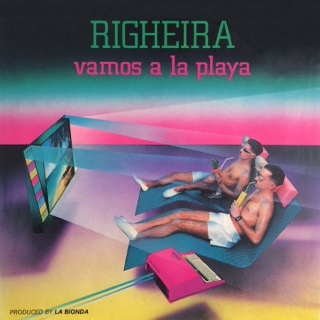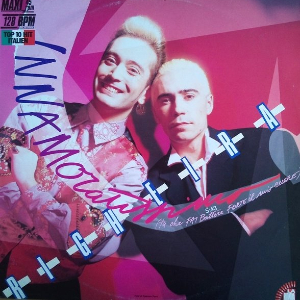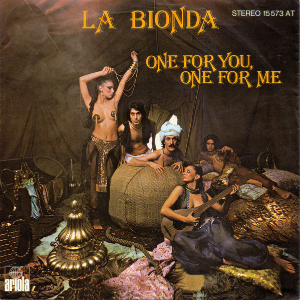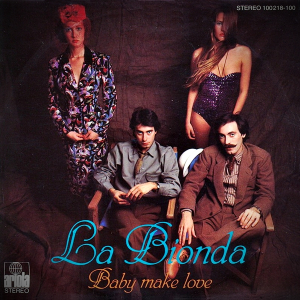
David Lubega Balemezi, better known by his stage name Lou Bega, is a German singer. His 1999 song "Mambo No. 5", a remake of Pérez Prado's 1949 instrumental piece, reached no. 1 in many European countries and was nominated for a Grammy Award. Bega added his own words to the song and sampled the original version extensively. Bega's musical signature sounds consist of combining musical elements of the 1940s and 1950s with modern beats and grooves.
Richard William Palmer-James is an English guitarist, songwriter and lyricist. He may be best known as one of the founding members of Supertramp ; writing lyrics for several songs by the progressive rock group King Crimson in the early 1970s; and for writing lyrics for the 1985 hit "(I'll Never Be) Maria Magdalena" by Sandra.

Righeira were an Italian Italo disco duo, formed in Turin in 1983, that comprised Johnson Righeira and Michael Righeira. Originally rooted in the early stages of Italo disco music, Righeira's musical style evolved throughout their career, incorporating elements of synth-pop and new wave in their songs in innovative ways, later exploring music styles such as electronic music and regular pop.

"Vamos a la playa" is a song by French Eurodance group Miranda, released in 1998 as the lead single from their debut studio album, Fiesta (1999). It peaked at number 7 on the Dutch Singles Chart, at number 4 on the Italian Singles Chart and at number 8 on the RPM Dance Chart in Canada. The vocals were performed by La Velle.

"No Tengo Dinero" is the debut single of Danish musical group Los Umbrellos, considered to be their signature song. It was released by FLEX Records on 14 May 1997. Based on the theme of 1960 film Never on Sunday by Greek composer Manos Hadjidakis, the lyrics were written by Jay and Richie Balmorian and group member Al Agami. It was produced by Kenneth Bager, Michael Pfundheller and Jan Elhøj, with additional production handled by Cutfather & Joe.

Giuni Russo was an Italian singer who specialised in experimental music after a short successful stint as an art-pop singer in the early 1980s. With her five-octaves range, she could produce extremely high notes and experimental sounds. She sang in Italian, English, French, German, Chinese, Spanish, Hebrew, Arabic, Persian and Latin.

"Vamos a la playa" is a song by the Italian Italo disco duo Righeira, released in 1983 as the second single from their debut studio album, Righeira (1983). It was written by Johnson Righeira, the duo's lead vocalist, and producer Carmelo La Bionda. The song was the duo's only charting hit in the UK, peaking at number 53 on the UK Singles Chart. The single also went to number one in Italy as well as the Swiss Hitparade. On the Dutch Top 40, it got as high as number two, and on the Official German Charts it peaked at number three.
La Bionda were an Italian disco duo consisting of siblings Carmelo (1949–2022) and Michelangelo La Bionda. They are considered among the pioneers of the Italo disco music genre.

"L'estate sta finendo" is a song by the Italian Italo disco duo Righeira that was released as a non-album single in May 1985. It was written by singers Johnson Righeira and Michael Righeira and producer Carmelo La Bionda. Released as the duo's fifth single in 1985 on the record label CGD, it reached number one in Italy. It was the winning song at the Festivalbar in 1985 as the most popular song of the summer.

Stefano Righi, known professionally as Johnson Righeira, is an Italian singer, songwriter, musician, record producer and actor. He is best known as the lead vocalist and primary lyricist of the Italo disco duo Righeira. After the duo disbanded for the second time in 2016, he pursued a solo career and founded the record label Kottolengo Recordings.
Italian Italo disco duo Righeira have released four studio albums, eight compilation albums, one extended play (EP), 14 singles and three music videos.

"No tengo dinero" is a song by the Italian Italo disco duo Righeira from their 1983 debut album Righeira. It was written by Michael Righeira, the duo's backing vocalist and producers Carmelo La Bionda and Michelangelo La Bionda. While not as successful as their earlier single, "Vamos a la playa", the song nonetheless achieved high popularity, hitting 12th place in Germany. Much like their previous single, the song is written in Spanish because it was considered an unusual combination with electronic pop music, and celebrating in spite of hardship.
"Luciano Serra pilota" is a song by the Italian Italo disco duo Righeira, included on their debut studio album, Righeira (1983). Johnson Righeira, the writer of the song, was inspired to write the song after an Italian war drama film of the same name.

"Innamoratissimo (Tu che fai battere forte il mio cuore)" is a song by the Italian Italo disco duo Righeira, released in 1986 as the second single from their second album, Bambini Forever (1986). The song was co-written by Johnson Righeira, Michael Righeira, Carmelo La Bionda, Michelangelo La Bionda, Sergio Conforti and Cristiano Minellono, and produced by La Bionda.

"One for You, One for Me" is a song by the Italian disco duo La Bionda from their 1978 album La Bionda. It was written by Carmelo La Bionda, Michelangelo La Bionda and Richard Palmer-James.

"Baby Make Love" is a song by the Italian disco duo La Bionda from their 1979 album Bandido. It was written by Carmelo La Bionda, Michelangelo La Bionda and Richard Palmer-James.

"Bianca Surf / Photoni" is the debut single by Italian singer Johnson Righeira, released in 1980, under the label Italian Records.
"Gli parlerò di te" is a song by the Italian Italo disco duo Righeira from their debut album, Righeira, released in September 1983. It was written by Johnson Righeira. It was also issued as a non-album single in Italy, in 1986, as the B-side to "Innamoratissimo ".
Stefano Rota, known professionally as Michael Righeira, is an Italian singer, songwriter, musician and actor. He is best known for his work in the musical duo Righeira.













